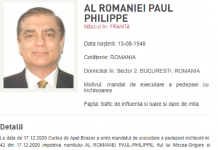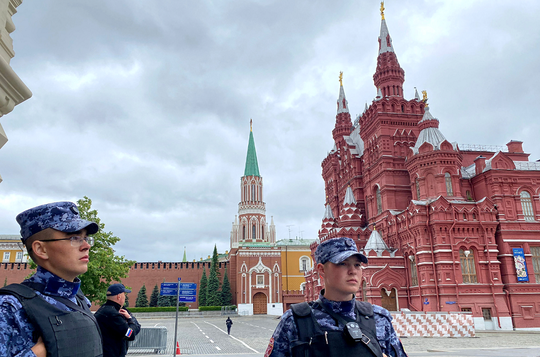Moscow is not just the national capital of Russia—it is the world capital of smoke and mirrors. Which is why the odd events of recent days may amount to more than meets the eye.
On the face of it, the weekend began with the leader of the Wagner Group launching a mutiny and taking over at least parts of the important Russian city of Rostov-on-Don. Wagner is a mega-militia largely staffed with ex-cons and linked to many of Russia’s atrocities in the Ukraine war.
Yevgeny Prigozhin then started to march on Moscow, threatening not to overthrow Russian President Vladimir Putin but the leaders of the military. It is possible that Prigozhin bit off more than he could chew and had a change of heart, because by evening, the tough-talking, scenery-chewing former catering tycoon had changed his mind in exchange a reported amnesty.
What caused him to turn around his band of bandits? Indeed, why had Putin tolerated abuse from Prigozhin for months. Such behavior would have gotten your average oligarch swiftly poisoned or thrown out of a window?
Usually, when things make no sense, ask „who benefits?” The world has just spent its Saturday fretting that Russia’s nukes might fall into the wrong hands—meaning slip out of Putin’s. Yes, Prigozhin is so awful that Putin—the first world leader to threaten nuclear war since the Cuban Missile Crisis—appears the responsible adult for the first time since launching his war on Ukraine.
This weirdness is especially fascinating in light of a TV debate I participated in last week on the I24 news channel, in which a shift in Russian propaganda was visible. It came from Janus Putkonen, a senior journalist of Finnish extraction who has lived in the occupied east of Ukraine for eight years and become a citizen of one of its „people’s republics,” as well as a clear adherent to the Moscow line.
Putkonen argued in all seriousness that Russia’s goals in Ukraine have been met, and that its troops sustained very few casualties while the Ukrainians were summarily thrashed. Even the failure to take Kyiv early in the war, he said, was planned.
This carries the distinct aroma of a propaganda machine shifting gears. Such machines have existed since the dawn of civilization, but the Russian version stands head and shoulders above the competition. It is the gold standard.
When one speaks these days of Russian propaganda, we’re not talking about the gross Soviet variant, with unreadable newspapers covering officials’ factory visits and reciting five-year plans. That’s a failed early experiment, although a version of it survives in China (they are still Communists by admission, after all).
The Vladimir Putin variant is at once less vulgar and more brutal, spewing reams of nonsense that can be entertaining, if one is very far away.
Mainly it is disseminated via the media, which is either owned by the government, in the hands of friendly oligarchs, or cowed into submission (else its leading figures are sometimes killed). But Putin also has technology at his behest. The propaganda is amplified by bot armies on social media, driven by SEO to every corner of the internet and brought to every home and every smartphone with dispatch.
Lies are not as boring and obvious as in previous iterations but cartoonish and sometimes clever, repeated insistently and argued with mesmerizing vigor.
A fascinating study by Rand called it the Firehose of Falsehood and identified four features: high-volume and multichannel; rapid, continuous, and repetitive; lacks commitment to objective reality; lacks commitment to consistency. It found that „volume and number” of sources mattered, to create the illusions of consensus and vehemence: „Multiple sources are more persuasive than a single source, especially if those sources contain different arguments that point to the same conclusion.”
It is not about mere false assertions; it is meta-lies flowing into utterly mendacious narratives that due to the super-cynical worldview are ridiculous by design. The bullshit is a feature and not a bug; truth has no advantage here.
The Soviets had a worldview as well—but it was untenable. Communism was clearly an economic failure, since lack of competition cannot breed excellence and is at odds with human nature. Putinism, based on nationalism and xenophobia, sadly is not. This is why whereas only the remotest Siberian peasant could believe the Soviet fictions, Putin’s are more seductive. Many people, even in the cities, want to believe.
Whether it is about why Russia is the defender in the Ukraine war, or how once-loyal oligarchs are meeting strange deaths by pure coincidence, or that Putin’s jailed rivals are not political prisoners, or about cooked financial books and historical revisionism par excellence, the propaganda is as shameless and absurd as it is relentless and effective.
Adolf Hitler and Josef Goebbels may have pride of place with the Nazis’ idea of the Big Lie – positing that the more preposterous a fib the farther it shall travel—but they could only dream of the impact their successor-liars enjoy today.
Since the Russian model of propaganda is best-in-class, it has imitators. There are copycat efforts to control the discourse, mainly through direct and indirect control of the media, in Hungary, Poland, Turkey and elsewhere.
In the show I mentioned, a panelist from Ukraine, Internews journalist Maksym Panchenko, was scandalized at the repeated claims that 250,000 Ukrainians are missing and that everything was going Russia’s way. He argued this was „propaganda,” and of course he is right: Russia’s army has underperformed disastrously in the 16 months of the misconceived and devastating war, leaving Putin exposed to politically dangerous charges of idiocy.
But I urged the Ukrainian not to quibble. It may very well be useful propaganda (and classic in its lack of commitment to consistency, as Rand might put it). That’s because if this is the new line, it looks very much like an attempt to prepare public opinion for a laying down of arms.
That might make some sense: The war us not going well for Russia at all, the economy is suffering, Ukrainian F16s are coming, and I doubt Russia actually wants to move the needle by setting off a nuclear weapon, its go-to threat du jour. After the weekend reminder of how Putin may not be the worst option in Russia, perhaps the West will forget about war crimes indictments.
Russia propaganda should be able to easily persuade its dazed populace that it was a glorious victory to have slightly expanded the country’s pre-war holdings in eastern Ukraine and especially to seize a land bridge between those areas to Crimea. Lie a little about the casualty count, and the propagandists’ work is done.
The question then, of course, would be what Ukraine would do.
The current position in Kyiv is that every square inch of the country’s sovereign land must be returned. The borders people are dying to reestablish were concocted by another propagandist named Vladimir, whose last name was Lenin. Would it really be worth it?
The Ukrainian people are so wound up over the war that a little propaganda may be needed to get them to calm down, as well.
















